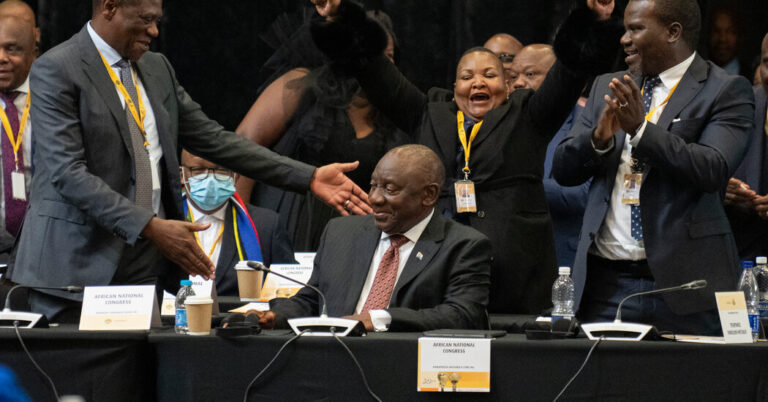South African President Cyril Ramaphosa is due to be sworn in for a second term on Wednesday, launching an administration unlike any the country has seen since the end of apartheid in 1994.
For the first time, Mr. Ramaphosa’s party, the African National Congress, or ANC, will have to govern in partnership with rival political parties as it failed to obtain an absolute majority in last month’s elections, receiving only 40 percent of the vote.
Mr Ramaphosa praised a new era of unity and collaboration. Not everyone is sold.
The partnership includes the second largest party, the Democratic Alliance, which received 22 percent of the vote and has long positioned itself as the ANC’s fiercest critic. The three other parties that joined the coalition each received less than 4 percent of the vote: the Inkatha Freedom Party, the Patriotic Alliance and GOOD.
A declaration of fundamental principles – for what the parties call a “national unity government” – signed by the five coalition partners includes their policy priorities. But the document is not very precise.
How will they revive a sluggish economy? Will they continue the affirmative action policies vigorously defended by the ANC but fiercely opposed by the Democratic Alliance? What about the controversial issue of racial disparities in land ownership?
Here are four challenges that the new South African government will face.
A difficult start could threaten the future.
There are already hints of tension that could lead to a rocky relationship in the future.
Ryan Coetzee, a former Democratic Alliance strategist who participated in coalition negotiations, written in a column on News24, a South African news site, that the ANC, almost until the end of the negotiation, seemed to resist the idea of having to share power with the Democratic Alliance.
“There is no doubt that its aim is to neutralize the DA,” Mr Coetzee wrote of the ANC. “This is wrong, because it will turn the government into a permanent battlefield and thus threaten its existence from the start.”
Mr Ramaphosa will have to quickly form a cabinet, taking into account the ministerial positions of the other parties. From there begins the difficult work of putting aside personal and ideological recriminations.
“I don’t think it will be an easy marriage,” said Thelela Ngcetane-Vika, a lecturer in international law and public policy at the School of Governance at the University of the Witwatersrand in Johannesburg.
The economy is so bad that it will be difficult to find solutions.
At the heart of South Africans’ discontent with the government is a sluggish economy characterized by high unemployment, gaping inequality and deep poverty.
The coalition government’s economic approach may well resemble that of the previous ANC-led government, which adopted largely centrist policies, said Trudi Makhaya, a former economic adviser to Mr Ramaphosa. “I think the narrative and the rhetoric will change, but not the substance,” she said.
Mr Ramaphosa, for example, has already embraced greater private sector involvement in creating jobs and boosting the economy, but this new government’s messaging is likely to emphasize this point even more, given the liberal position of the Democratic Alliance, Ms Makhaya said.
The Democratic Alliance has called for the continuation of Operation Vulindlela, an initiative launched under Mr Ramaphosa which aims to strengthen critical infrastructure, in part through privatisation. The Democratic Alliance could also push the government to accelerate efforts to cut regulations to spur more investment in the country, Ms Makhaya said.
The partners have very different views on race.
The issue likely to cause the greatest friction between the ANC and Democratic Alliance is how to tackle persistent racial disparities.
Many ANC members have been adamantly opposed to a coalition, arguing that the Democratic Alliance denies the very existence of racism and wishes to maintain the status quo of a white-dominated economy. Democratic Alliance officials rejected this characterization.
“We believe transformation means improving efficiency, improving infrastructure and making the state work,” said Helen Zille, chair of the Democratic Alliance Federal Council, explaining her party’s approach to supporting racial groups historically disadvantaged.
During the election campaign, the Democratic Alliance proposed scrapping Black Economic Empowerment, one of the ANC’s flagship measures aimed at incentivizing businesses to be black-owned and managed. Because the law is so important to the ANC and its base, Ms Makhaya said she could imagine the Democratic Alliance pushing for reforms that could allow her to run but make her more palatable to her supporters .
One of the most controversial indicators of broader racial disparities is the fact that most of the country’s land remains white-owned. While left-wing politicians – including many ANC members – have called on the government to take land from white landowners without compensating them, a stance antithetical to the Democratic Alliance’s economic philosophy.
The ANC has largely adopted a centrist land policy, so it is unlikely to propose anything radical. But Ms Makhaya said the ANC could better implement measures already planned – such as giving unused public land to private individuals – to advance land reform.
Coalition factions approach foreign policy differently.
The ANC has aggressively pursued a foreign policy that runs counter to some Western interests, including accusing Israel of committing genocide in Gaza before an international court and refuse to condemn Russia’s invasion of Ukraine.
The Democratic Alliance tends to side more with South Africa’s Western allies, such as the United States and the European Union, which together have the most important trade relations with the country.
“You’re going to see a lot of contestation and not really any common ground” on foreign policy, said Lebogang Legodi, a lecturer in politics and international relations at the University of Limpopo in South Africa.
Nonetheless, Mr Ramaphosa maintains warm relations with Western powers and allies like China and Russia. The main tensions with the Democratic Alliance could arise in debates over South Africa’s role in global institutions like BRICS, a multinational bloc competing with the West, and recently welcomed Iran as one of its new members.


